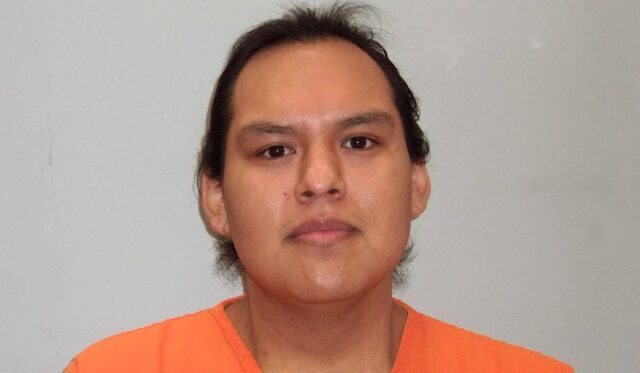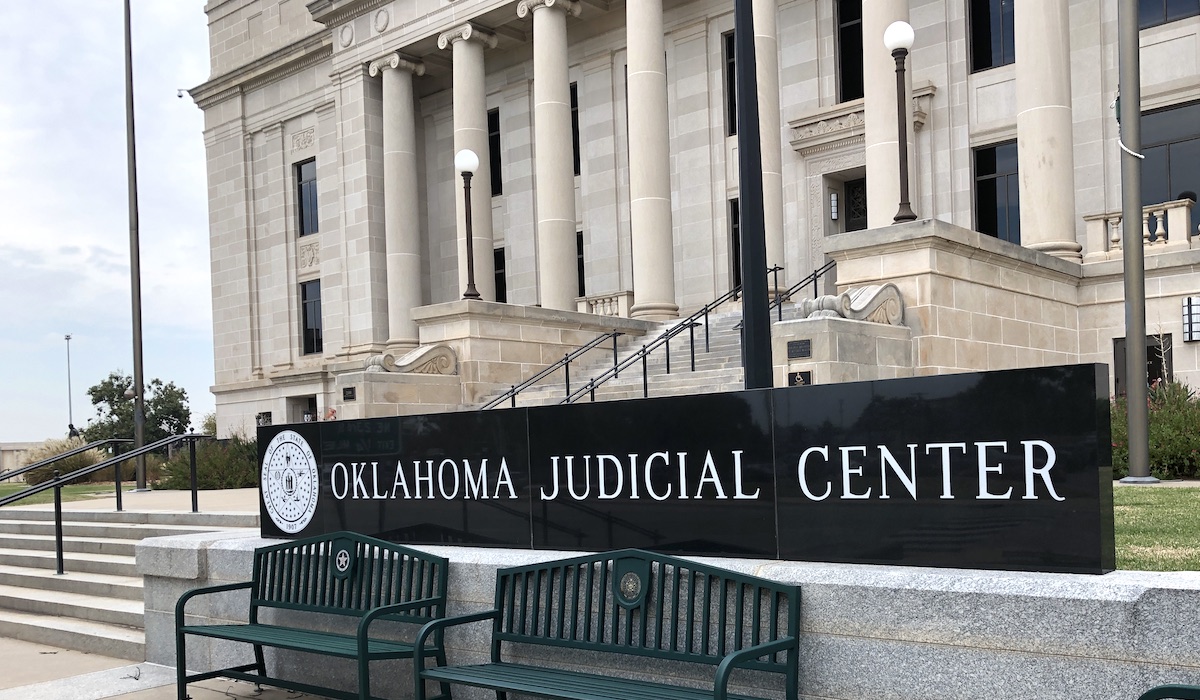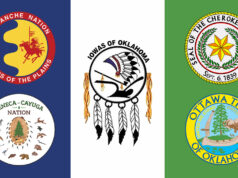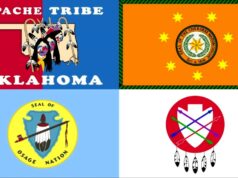

The Rogers County Sheriff’s Office served a search warrant and arrested Brayden Kent Bull on Nov. 18, 2021, for possession of child pornography. Since then, three different governments have filed criminal cases against him, more than 10 different judges have heard parts of the cases, and two years later he still has multiple pending court dates.
Bull’s legal saga is an unusual one in a country where the U.S. Constitution’s Fifth Amendment protects individuals from “double jeopardy,” or being charged with the same crime twice. But double jeopardy has a major exception when more than one sovereign government — state, federal or tribal — has jurisdiction.
Because Bull, a Navajo Nation citizen, possessed and distributed child pornography within the boundaries of the Cherokee Nation Reservation, Rogers County deputies transferred him to tribal custody after his arrest, and the Cherokee Nation charged him Dec. 10, 2021. But as the nation’s prosecution of the case lingered for a year and a half, Rogers County District Attorney Matt Ballard sought an arrest warrant in June 2023 to charge Bull in state court as well. However, Rogers County District Court Special Judge Terrell Crosson said he lacked jurisdiction to issue the warrant because Bull is a tribal citizen within reservation boundaries.
Ballard and a special prosecutor appointed by Gov. Kevin Stitt appealed Crosson’s dismissal to the Oklahoma Court of Criminal Appeals.
While the appellate court weighed arguments and rejected a request for the Cherokee Nation to file a brief opposing the state’s appeal, the U.S. Attorney’s Office for the Northern District of Oklahoma brought its own charges against Bull, who pleaded guilty in federal court one week before the state appellate court held that state law required Crosson to have granted the county arrest warrant regardless of the defendant’s tribal citizenship.
Ultimately, the three-court legal circus of Bull’s prosecution yielded a precedential decision in State of Oklahoma v. Crosson, which landed Nov. 16 as another step in the Stitt administration’s effort to establish state jurisdiction over Indian defendants within reservation boundaries. But with federal legal precedent holding that only tribes and the federal government have criminal jurisdiction in such cases, the Crosson decision could foreshadow additional appeals, litigation or disputes about the law of the land in eastern Oklahoma.
An initial Cherokee Nation charge
State law enforcement started investigating Bull in April 2021 after Snapchat reported messages he sent on the application as being child pornography. By May, investigators subpoenaed his internet service provider and found his address, and by November there was enough evidence to obtain a search warrant.
On Nov. 18, 2021, deputy sheriffs searched Bull’s home in Rogers County and arrested him, finding evidence to charge him with possession, distribution and the manufacturing of child pornography. Since Bull is a citizen of the Navajo Nation and his crime occurred on the Cherokee Nation Reservation, the Cherokee Nation had criminal jurisdiction.
The next day, Judge T. Luke Barteaux of the Cherokee Nation District Court found probable cause for the arrest and set his bond for $100,000. On Dec. 10, an assistant attorney general filed a charge in Cherokee Nation District Court for possession of child pornography against Bull.
After entering an initial plea of not guilty Dec. 14, Bull’s case moved at a glacial pace. Over the next two years, a dozen more court dates came and went in the Cherokee Nation, each resulting in a continuance. Starting in April 2022, the court minutes hinted as to why Bull’s case was moving so slowly with the phrase “reset to charge on federal status.”
Rogers County pursues its own case
That phrase in the Cherokee Nation court minutes appears to indicate that tribal prosecutors were expecting the federal government to bring charges and handle Bull’s case.
But by May 2023, no other charges against Bull had been filed in any court. In June, Ballard, the Rogers County DA, filed three felony charges against Bull in state district court and applied for an arrest warrant, which received an immediate denial from Crosson, the Rogers County special judge.
“This court hereby denies the state of Oklahoma’s request for this court to issue a warrant for the arrest of Brayden Kent Bull due to the absence of state jurisdiction, pursuant to McGirt v. Oklahoma and Hogner v. State,” Crosson wrote in his June 29 order.
Ballard quickly appealed the order and caused State v. Crosson, which was pending between July and November. Stitt intervened in the case by appointing special counsel Mike Fields, then a district attorney in western Oklahoma, to oversee the appeal. While the appeal was ongoing in state court, the federal government decided to file its own charges against Bull in August.
By September, Bull was in federal custody. After some October motion filings, Bull pleaded guilty to his federal charges in November, about a week prior to the Oklahoma Court of Criminal Appeals issuing its ruling in State v. Crosson.
Bull’s federal plea agreement sets his sentence at somewhere between 30 and 50 years in federal prison, a significantly longer sentence than the three-year maximum sentence applicable in tribal courts. While Bull awaits federal sentencing, his cases in the Cherokee Nation and in Oklahoma are still pending.
Bull’s next court date in the Cherokee Nation is set for Thursday, Jan. 11, while his Rogers County case is set for Jan. 29. In an interview with NonDoc, Ballard said the state case is “continuing.”
Ballard said his office is paying attention to the federal sentencing process and will base decisions about how far to continue the state case on the final outcome of the federal process. The Cherokee Nation indicated in its motion for leave to file an amicus brief that “after federal prosecution the nation will continue to prosecute him” and “the Cherokee Nation is next in line to do so.”
Oklahoma Court of Criminal Appeals decides State v. Crosson

Underscoring the prickly nature of the Court of Criminal Appeals ruling, neither Stitt’s office nor the Cherokee Nation responded to requests for comment about the case prior to the publication of this article.
Bull’s legal drama resulted in a new precedential decision from the Oklahoma Court of Criminal Appeals. The decision in State v. Crosson found that when a state court judge is presented with an arrest warrant supported by probable cause, the judge must issue the warrant. The appellate judges said no McGirt analysis involving Indian status is allowable at that stage.
“The parties advance numerous arguments surrounding the effect of (Oklahoma v.) Castro-Huerta on a magistrate’s decision to issue a warrant. While these arguments will undoubtedly play out in the trial court, it is our holding that they should be resolved by our adversarial system, not the limited ex parte review of a magistrate in considering the issuance of an arrest warrant. That decision simply begins and ends with Section 171,” wrote Court of Criminal Appeals Judge William J. Musseman.
Cherokee Nation denied amicus brief request
In September, the Cherokee Nation requested permission to file an amicus brief opposing the state’s position, but state appellate judges denied the application. The nation’s motion argued that the state’s briefs omitted the fact Bull had been in tribal custody and that the Cherokee Nation had an active case filed against him. Notably, the Bull case was one of the last worked on for the Cherokee Nation by newly appointed federal judge for the Northern District of Oklahoma Sara Hill.
The Cherokee Nation filing further alleged that the state’s “motivation is to secure a court order that is wholly detached from the facts of this case, but which petitioner can use in other cases.”
Stitt’s legal filings invoked his role as “special guardian of the state and its interests” in making the appointment of Mike Fields as special counsel in the case.
“Although the defendant is a member of the Navajo Nation, this isn’t an Indian issue; this is a public safety issue of first importance,” Stitt’s attorneys concluded in their application to appoint Fields.
Follow @NonDocMedia on:
Facebook | X | Text or Email
Double or triple jeopardy for Brayden Bull? Well, neither
Under the separate sovereigns doctrine, a person may be charged for the same crime twice if they are charged by different “sovereigns,” or distinct governments. In the United States, there are three clearly identifiable types of sovereigns: the federal government, state governments and tribal governments. Local governments, like municipalities and counties, are part of each individual state and are not separate sovereigns.
While being charged for the same crime by different governments may sound unusual, Oklahoma’s history holds a memorable example: Terry Nichols, Timothy McVeigh’s partner in the Oklahoma City bombing. Nichols’ trial in federal court ended in a life sentence without the possibility for parole handed down in 1998.
Unsatisfied with the results of the federal case, attorneys for Oklahoma brought charges against Nichols in state court hoping to obtain a death sentence. But, in 2004, Nichols was found guilty in state court and again sentenced to life in prison without parole.




















